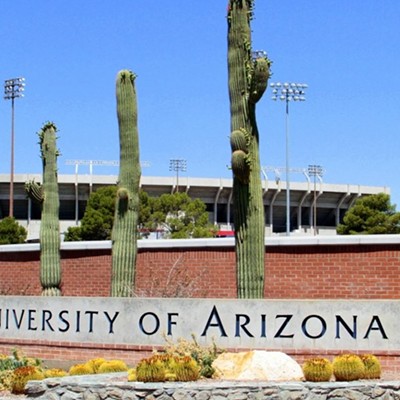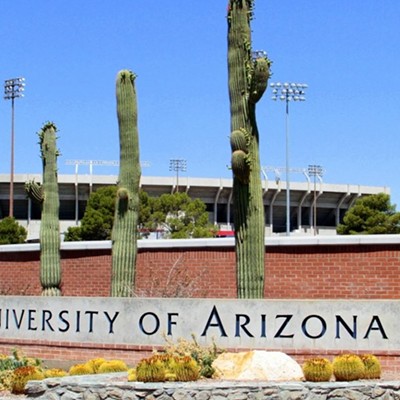"We're going to really get as proactive as possible to get people to understand that their safety is as safe as they want to make it," says Patrick Call, associate director of Residence Life.
With 20 residential halls and apartments housing almost 5,000 students, Residence Life oversees students living in campus housing. And they're not the only ones eyeing the unique safety concerns as the upcoming school year begins.
"The dynamics of that whole area change when school starts because of the increased population," says Sgt. Judy Altieri, a Tucson Police public information officer. "Because of that, the beat officers that work in that division are going to pay extra special attention to things that are going on there."
"There aren't necessarily any new programs geared towards (9/11) but, from a law enforcement point, we're more plugged in with a lot of information from the federal agencies," says Sgt. Michael Smith, a University of Arizona Police Department spokesperson.
"So, law enforcement has changed but what you see on campus probably doesn't look any different then it did before."
Neither TPD or UAPD will go into specifics for understandable reasons.
If some security "event" on campus was to occur, UAPD does have an evacuation plan in place and maintains a close working relationship with TPD and other area agencies. UAPD officers have the same power and authority as any other police officer in the state and maintain a concurrent patrol boundary with the TPD. UAPD's 51 officers regularly patrol the areas between Lester Street to the north, Campbell Avenue to the east, Eighth Street to the south and Euclid Avenue to the west.
"Certainly our relationship with UAPD is that we oftentimes assist when they need it just because of the resource issues," says TPD's Altieri.
"But we're certainly not going into their jurisdiction and make a decision about how they handle a situation for them," says Altieri. "That wouldn't be our place."
With 155 buildings and a population of some 50,000, an emergency on campus could be a logistical nightmare. UAPD is tapped into federal agencies and would be contacted if a threat to the campus was perceived. But, according to UA Associate Vice President of Communications Sharon Kha, "there are a lot of reasons the FBI would not communicate everything they know." Kha, who is responsible for the campuswide alert system, says it's a question of whether it is something that needs to be communicated.
"It the answer is yes, we do have an emergency communications plan that reaches the campus community by e-mail," says Kha, who points out there is a backup "800" number located out-of-state in case UA's phone and computer system goes down.
There's also a special Web site that goes up in the event of an emergency.
"We put one up very quickly on September 11 so we would have all the information there was to share."
But sometimes all the information is not shared. This happened a few years ago when a "biological agent" was discovered on the grounds of the campus. The alert went out, but not everything officials knew--that the container was labeled to contain the deadly ebola virus. The reason was that officials on the scene felt it was a hoax.
"This was a case in which saying 'a tube labeled ebola virus has been found' could have caused such panic and disruption that they elected not to disseminate the information at that moment, but to check it out," says Kha.
But such an "event" is, well, academic compared to more tangible crimes on campus every year.
According to the latest UAPD statistics, assault and robbery are the top two campus crimes. At the top of theft list is a relentless number of petty thefts--especially of bicycles. But last year four students were sexually assaulted on and around campus.
Another rash of six assaults took place this year, mainly in residence halls, but also in a Park Avenue garage when a student was raped just before noon April 25 as she was getting out of her car. It was the most serious group of sex crimes UAPD had seen in a decade. Those sexual assaults resulted in stepped-up foot patrols by UAPD. According to UAPD's Smith, the recent sexual assaults have "done more for our campus as far as awareness of crimes."
"It hit home a little bit more than even 9/11 did just because (9/11) felt so remote to a lot of people," says Smith.
Because of the sexual assault spree, Residence Life and UAPD implemented a permanent "lock-down" of all residence halls on campus, keeping them locked 24 hours a day. Visitors must be escorted from the front door to the room of the student they are visiting to deny access to strangers--"tailgaters"--who follow students into the building.
Residence Life officials also began to issue students light/whistle combinations last spring. Even transportation services changed on campus. "Safe Ride" has expanded its service to pick up and drop off students at their cars in university parking garages, in response to April's assault in the Park Avenue garage. According to Associated Students of the University of Arizona, the campus has offered Safe Ride since 1996, which takes students to their dorms between 7:30 p.m. and midnight most evenings. Before the garage incident, Safe Ride drivers could not enter the garages because they had no way of getting out without paying the exit fee.
"Student Life Line"--the emergency taxi service--is picking-up another end of travel safety for students and staff.
"That's a new program that we're starting this year," says Drnek. "You call the cab company and they will pick you up where ever you are and take you within 100 miles--to the address on your card, or to a hospital or a police station."
The UA also maintains some 120 blue-light emergency telephone units found in every parking garage, residence halls, campus buildings and directly connect to UAPD.
Residence Life and ASUA say incoming freshman living in the residence halls are safe as long as rules are followed, but there may be issues for campus newcomers a year after 9/11.
"One of our concerns are the freshman who are coming in who were in high school when they dealt with 9/11," says Doug Hartz, president of the student group. Not only will this be the first anniversary of 9/11, for many students it will be their first time away from home.












